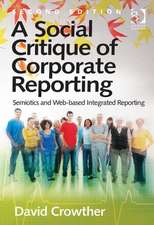The Road to Co-operation: Escaping the Bottom Line
Autor Gordon Pearsonen Limba Engleză Hardback – 28 apr 2012
Preț: 825.21 lei
Preț vechi: 1105.88 lei
-25% Nou
Puncte Express: 1238
Preț estimativ în valută:
157.90€ • 164.54$ • 130.74£
157.90€ • 164.54$ • 130.74£
Carte tipărită la comandă
Livrare economică 03-17 aprilie
Preluare comenzi: 021 569.72.76
Specificații
ISBN-13: 9781409432029
ISBN-10: 1409432025
Pagini: 276
Dimensiuni: 174 x 246 x 23 mm
Greutate: 0.75 kg
Ediția:1
Editura: Taylor & Francis
Colecția Routledge
Locul publicării:Oxford, United Kingdom
ISBN-10: 1409432025
Pagini: 276
Dimensiuni: 174 x 246 x 23 mm
Greutate: 0.75 kg
Ediția:1
Editura: Taylor & Francis
Colecția Routledge
Locul publicării:Oxford, United Kingdom
Cuprins
Contents: Preface; Part I Coercion by Ideas: Ideas about the economy; Ideas about 'the market'; Ideas about 'the firm'; Ideas about people. Part II The Unsustainable Context; Externalities and sustainability; Part III Corporate Governance and Accountability: Governance in post-industrial economies; Governance in industrial economies; Governance in industrialising economies; Corporate accountability and integrity. Part IV Sustainability and Co-Operation: Towards a sustainable theory; Degrees of co-operation; Enabling co-operation and co-ownership; Bibliography; Index.
Notă biografică
With a long industrial and academic experience, Gordon Pearson has carved out a distinctive position focusing on the impacts of economic and behavioural theory on the practical realities of business management. His practitioner experience in manufacturing extended to general and strategic management. His PhD focused on innovation and identified strategy and culture as critical. This is his seventh book and follows The Rise and Fall of Management, also published by Gower in 2009. Read his blog at www.gordonpearson.co.uk
Recenzii
’I simply loved reading this book. While some of the subject matter was familiar territory (as a former Chief Executive, for eleven years, of the New Economics Foundation), I thought it was wonderfully written with a deft touch and very great authority. The result is something that is a real contemporary classic, in terms of articulating the case for an economy that, as the title echoes, can generate shared and sustainable freedom.’ Ed Mayo, Secretary General, Co-operatives-UK 'In an era when management is celebrated and damned in equal measure, it is exciting to find a book which offers sensible but radical suggestions for actually doing something about it. Gordon Pearson's diagnosis of the problems of short term shareholder focus and management greed are spot on, and this is a book I would recommend to anyone who wants to build a collective and fairer future.' Professor Martin Parker, Warwick Business School, Warwick University. 'For anybody who thought that maximising shareholder value is and should be the main focus of our understanding of governance and business, think again! Pearson provides a cogent, entertaining and thoroughly compelling critique of governance and corporate policy while offering practical alternatives for a post credit crisis world'. David Leece, Professor of Financial studies, Manchester Metropolitan University Business School 'Gordon Pearson's The Road to Cooperation is a lucid critique of the cult of neo-liberal economic orthodoxy and its celebration of 'maximising shareholder value'. Particularly telling is the contrast with the view of Adam Smith that self-interest should be gauged over the longer term. I unhesitatingly recommend this book.' Philip Whiteley Subject Matter Expert for the Chartered Management Institute. 'Pearson mounts a convincing critique of the neoclassical economic foundations of management theory and makes a compelling case for a new cooperative economic paradigm. This should be required reading for business
Descriere
Gordon Pearson offers this critical and informed protest against the absurdity and error of economic theory, shedding new light on the predicament faced in 2012. He highlights the dangers of using bizarre mathematical models to guide policy prescriptions, arguing that the global challenges of growth and sustainability affect free market fundamentalist orthodoxy, causing a negative impact on enterprises, their governance and their stakeholders. His proposed realistic changes in policy and practice means The Road to Co-operation should be considered invaluable for today's business faculty, students and practitioners. This is Gordon's seventh book and follows The Rise and Fall of Management.















